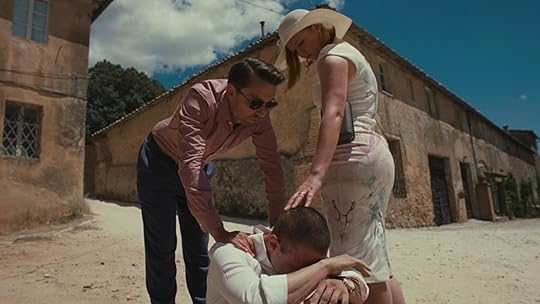Succession’s Inheritance

The real star among the many excellent aspects of Succession is the camerawork. Shaky handheld shots, constant zooms in and out, swooping pans, weird angles—they combine to create a delirious, immersive, almost nauseating aesthetic.
At first, it feels like the camera work is voyeuristic, making the viewer feel as though they are awkwardly not where they are supposed to be, eavesdropping on intimate, nasty family business (and nasty business business too). Yet the more I watch the show, the more the camerawork is not voyeuristic. It is instead oddly participatory. The camera almost makes the viewer another family member in this very dysfunctional family, a part of its closed fictional world.
It closes us in, oddly, by appropriating the camerawork of the reality televison show. Many have noted the inspiration of documentary films, cinéma vérité, and Dogme 95 in the camerwork. I see a different inspiration: The Office, particularly the original British version of the show. That was also a satire, as is Succession. While it was more overtly a comedy, one that ultimately played it sweet below its critique, one might say The Office set the stage (or rather, prepared the lens) for Succession‘s approach.
The Office‘s faux-reality show camerawork created a tone of brutal self-awareness and awkwardness, in which fictional characters became infinitely more fake by pretending to be real for the camera. Here was a new language of painful exposure. The fake reality show brought the glaring falseness of the genre into the glaring spotlight.
Now on Succcession, we have a fictional show that has folded in the camerawork of the fake reality show farce into a kind of Billions or Sopranos-style drama. It’s a new sort of hybrid form of prestige TV (or is it film?) in which we don’t quite know where we are. The disorientation is the point, and it reinforces the writing and acting, which are highly attuned to David Brent levels of self-delusion.
Succession is a show always on the brink of breakdown. The camera signals a knowing wink. It is recognizable as the reality show check-in with the audience, but we are not in a reality show—or even a faux-reality show—anymore. We are in a fully fictional world, yet the camera keeps proposing that it is real. Or maybe it is a fully real world and we keep being reminded that it is fake. Who knows?
Most of all, the use of reality television show camerawork accentuates the dreamy lack of reality. Who are these rich people? Why should we give a shit about them? Maybe we shouldn’t, Succession‘s camerawork repeatedly proposes. Yet even as it throws the viewer to the lions of this cynical, rotten, inbred fictional world, a closed universe which is almost so absurd as to ring true, we cannot escape it.
This is the success of Succession. One longs to get away from the immersive relentlessness of its sneering moral decay, but the teeth keep coming too close for comfort. One hopes to step back from its commanding swirl of foul betrayal, but the dust chokes our throats. We get too near and the camera keeps smacking us around for this, much as all the characters do to each other.
We seek some perch away from the viciousness, some respite from the endless harsh grip of the frame, but the camera won’t let one out of the bloody arena, a theater of cruelty.



